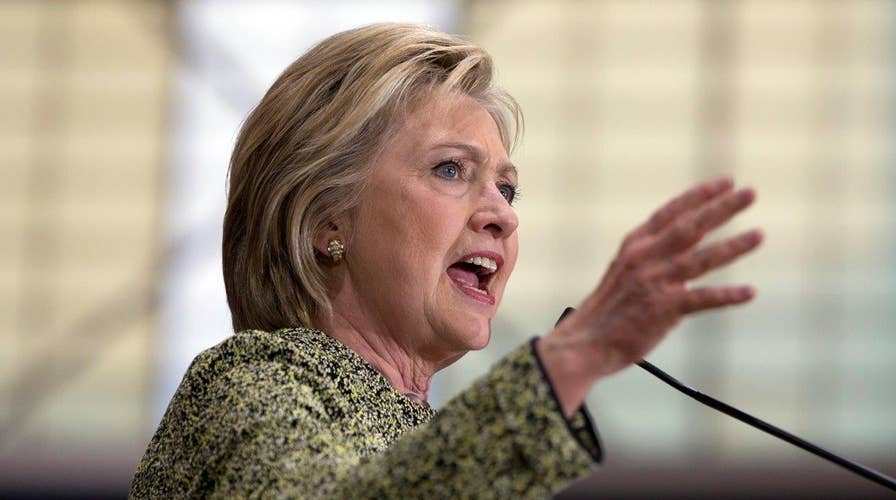New information on 22 top secret Clinton emails
Catherine Herridge reports from Washington, D.C.
Former Hillary Clinton IT specialist Bryan Pagliano, a key witness in the email probe who struck an immunity deal with the Justice Department, has told the FBI a range of details about how her personal email system was set up, according to an intelligence source close to the case who called him a “devastating witness.”
The source said Pagliano told the FBI who had access to the former secretary of state’s system – as well as when – and what devices were used, amounting to a roadmap for investigators.
"Bryan Pagliano is a devastating witness and, as the webmaster, knows exactly who had access to [Clinton's] computer and devices at specific times. His importance to this case cannot be over-emphasized," the intelligence source said.
The source, who is not authorized to speak on the record due to the sensitivity of the ongoing investigation, said Pagliano has provided information allowing investigators to knit together the emails with other evidence, including images of Clinton on the road as secretary of state.
The cross-referencing of evidence could help investigators pinpoint potential gaps in the email record. "Don't forget all those photos with her using various devices and it is easy to track the whereabouts of her phone," the source said. "It is still boils down to a paper case. Did you email at this time from your home or elsewhere using this device? And here is a picture of you and your aides holding the devices."
A source close to Pagliano did not dispute the basic details of what was provided to the FBI, but said the highly skilled former State Department IT specialist had met with the bureau on a "limited basis" and was at best a "peripheral" player in the investigation.
At a Democratic debate Wednesday evening, Clinton brushed off the question when asked by the moderator whether she would withdraw from the presidential race if faced with criminal charges.
Univision’s Jorge Ramos asked, "If you get indicted, will you drop out?" Clinton responded, "My goodness. That is not going to happen. I'm not even answering that question."
She then added her now standard explanation that nothing she sent or received was marked classified at the time. While technically correct, the distinction appears misleading. The January 2009 classified information non-disclosure agreement signed by Clinton says she understood that classified information could be marked and unmarked, as well as verbal communications.
Classification is based on content, not markings.
The intelligence source said the FBI is "extremely focused" on the 22 “top secret” emails deemed too damaging to national security to publicly release under any circumstances, with agents reviewing those sent by Clinton as well her subordinates including former chief of staff Cheryl Mills.
"Mrs. Clinton sending them in this instance would show her intent much more than would receiving [them],” the source said. "Hillary Clinton was at a minimum grossly negligent in her handling of NDI [National Defense Information] materials merely by her insisting that she utilize a private server versus a [U.S. government] server. Remember, NDI does not have to be classified." According to the Congressional Research Service, NDI is broadly defined to include “information that they have reason to know could be used to harm the national security.”
It was emphasized to Fox News that Clinton’s deliberate “creation” and “control” of the private server used for her official government business is the subject of intense scrutiny. Pagliano knows key details as to how the private server was installed and maintained in her home.
The 22 “top secret” emails are not public, but in a Jan. 14 unclassified letter, first reported by Fox News, Intelligence Community Inspector General I. Charles McCullough III notified Congress of the findings of a recent comprehensive review by intelligence agencies identifying "several dozen" additional classified emails -- including specific intelligence known as "special access programs" (SAP).
That indicates a level of classification beyond even "top secret," the label previously given to other emails found on her server, and brings even more scrutiny to the presidential candidate's handling of the government's closely held secrets.
Pagliano's lawyer offered no on-record comment for this report. Clinton recently told CBS, “I'm delighted that [Pagliano] has agreed to cooperate, as everyone else has. And I think that we will be moving toward a resolution of this.”
The FBI has not commented beyond the public statements of FBI Director James Comey, who recently told Congress: “I can assure you is that I am very close personally to that investigation to ensure that we have the resources we need, including people and technology, and that it’s done the way the FBI tries to do all of its work: independently, competently and promptly.”
The intelligence source described the morale of agents as "very good and nobody is moping around which is the first sign a big case is going south."





